
Canadians no longer need to get visa on arrival anymore and everything is back to normal before UAE and Canada got into a dispute. Finally! [Link]
Picture taken by Patrick
There are two things I did in Prague that I would highly recommend to everyone going there.
Hit the slopes
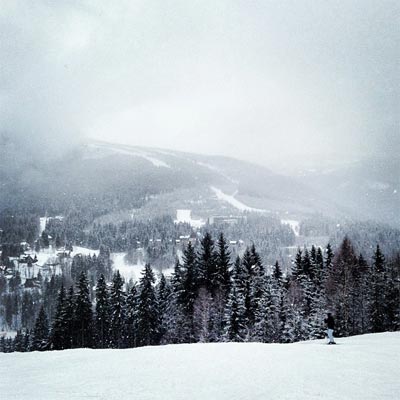
If you have the time and you’re there in winter then I’d highly recommend you hit the slopes. The cheapest option I found was around 75 Euros per person including travel to the resort from the city and including rental gear and slope passes. But, the resort was tiny and mostly made up of fake snow. I ended up going to Špindlerův Mlýn which cost considerably more but that’s due to the the location being around 2 hours away from the city. The resort was huge and there was lots of soft powder snow since it was snowing when I was there. I went midweek so the slopes were mostly empty which meant I never had to wait in line for the ski lifts or bother navigating hoards of skiers on the way down. The slopes are not all connected together but there was a free shuttle bus service to navigate from one slope to another. The whole experience cost me around KD90 but that included snowboard gear rental, a half day pass to the slopes and a personal driver for half a day as well.
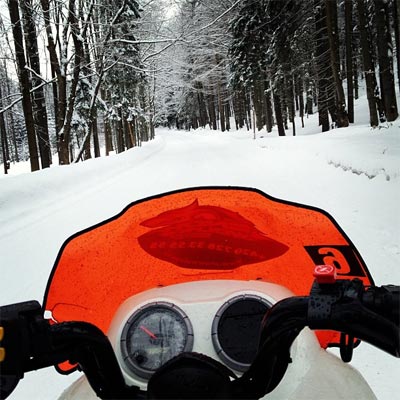
While there I would highly recommend you rent a snowmobile as well. They rent for a minimum of 1 hour and you go off alone with just a black and white map that makes absolutely no sense. I think it was around KD20 for the hour, I don’t remember but I took the snowmobile and headed all the way up to a peak. It was snowing and foggy along the way and I froze my ass off but the trip was really beautiful and scenic.
Visit the psychiatric hospital

Ok I know this sounds weird and it is but it’s really worth the experience. I went and had lunch at the Psychiatrická léčebna Bohnice cafeteria. I had read on a forum online that the staff that work there are recovering patients and that the visitors are families visiting their loved ones at the hospital. Anyway the hospital grounds is huge, like a massive university campus. The buildings all looked like they had been built in the early 1900’s with beautiful but crumbling architecture and looks of interesting looking floor tiles. The cafeteria had a style that wouldn’t have looked out of place in Stanley Kubrick’s The Shinning but don’t expect the food to be anything exquisit. Actually don’t expect to really eat there, maybe just a slice of cake and a RC Cola since the menu really didn’t have much food just microwaved sausages and croissant.

Still it was a different experience and one that doesn’t cost much to try. The trip from the city to the hospital by cab was KD7 and I think I paid like 800 fils for my lunch and desert.
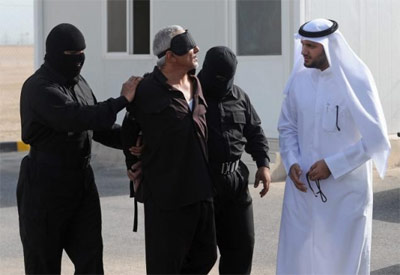
There has been a lot of debate about the pros and cons of capital punishment in the past few days which is why I wanted to take the time to explain capital punishment in the Kuwaiti law.
What is the procedure before getting capital punishment?

So an accused gets three trials, when he gets a guilty verdict in a trial he HAS to appeal. If he doesn’t appeal then the public prosecution will appeal the case. Before being sentenced with capital punishment an accused has to be proven guilty three times in three different trials made up of different judges. After three different guilty verdicts, the accused get sentenced to capital punishment. But, even then, capital punishment would not be executed unless the highest authority signs off on the sentence.
Who is exempted from capital punishment?

What are the crimes that you would get capital punishment for?
The below apply to everyone, Kuwaiti or non Kuwaiti, visa or no visa, pretty or ugly… as long as you committed the crime in Kuwait.
– Murder, deliberate + premeditated by il will (Article 150 with a def in Article 151)
– Any person that kidnaps another person using force or threat or with the intent to kill, hurt or rape (Article 180)
– Sexual intercourse with a female without her consent and the accused was related to the girl, or was her teacher, her caretaker or her servant. (Article 186)
– Sexual intercourse with a female with her consent but the female is not mentally stable and the accused knew this or if the girl was under 15 years of age. In both cases the accused was related to the girl, or was her teacher, her caretaker or her servant. (Article 187)
– Capital punishment found in other Kuwaiti laws like national security crimes (treason for example)
– For growing, selling, buying or importing or exporting drugs the accused might get capital punishment. But, if you add any of the following points as well then the accused will get capital punishment:
1) The drug is cocaine, heroine, Acetyldihydrocodeine and Codeine
2) You’re a public employee
3) Used a minor to help with the drug crime
4) Its the accused 2nd time convicted of either growing, selling, buying or importing or exporting drugs
The above is based on the Kuwaiti law and not my opinion. If there is anything that isn’t clear leave a comment below and I will try to clarify it.
Fajer Ahmed – Legal Counsel
Have a Kuwait law related question? Email me at [email protected]
The legal opinions expressed in this post are those of the author Fajer. Opinions expressed by Mark or any other writer on mark248am1.wpenginepowered.com are those of the individual’s and in no way reflect Fajer’s opinion.
They might as well have live streamed it with their social media person posting pictures on their Instagram account. [YouTube]
Update: Video link updated since previous one was taken down.

Last month on March 16th, a speeding camera flashed me late at night on my way home. Since I had recently signed up with the MOI’s traffic violations notification service, I marked the day down on my calendar so I could figure out how long it would take before I get an SMS. Finally, yesterday (April 1st) I got the message saying I owe a KD30 fine for speeding.
So basically it takes around 2 weeks from the day you get caught for the fine to register. That’s not that bad.

It took a lot of new burger joints and a lot of cupcakes but in the end we finally managed to top the list.
A round of double cheeseburgers on me! [Link]
Thanks Khalid
Last week a user in the forum posted asking for legal advice. His brother was accused of shoplifting and needed some legal advice. I asked my lawyer friend to look at his question and then it gave me an idea, how about Kuwait law related posts on this blog? Starting from today my friend Fajer is going to be posting every now and then on this blog answering law related questions, she’s already started with the post below on shoplifting. If you have any law related questions you could contact her on [email protected] and we’ll be choosing the most interesting ones to answer on the blog. This should be interesting.
Hi everyone, my name is Fajer and I’m a legal counsel at a local law firm. One of Mark’s forum users had a law related question and he thought it might be a good idea to get me involved on the blog with law related posts starting with the questions his forum user had. I’ll post the users problem first followed by my response below it.

THE PROBLEM
My brother was accused of shoplifting a packet of AAA batteries at a supermarket. He was leaving the supermarket when the detector at the exit started buzzing and they found the battery pack on him. It was by accident and he tried to explain that to them but he was arrested, booked and slapped with a robbery case as well as a travel ban.
My questions are the following:
1) What is the law here towards shoplifting?
2) Is it justifiable to send a guy to jail and keep him there for more than 24 hours without a case?
3) I heard from a friend of mine supermarkets usually don’t get first time offenders arrested and just end up paying a penalty instead is that true?
4) Is it possible to friendly settle this case out of court?
THE RESPONSE
The answer to your situation is not very straight forward but I will try to go through your questions and explain everything to you.
1) What is the law here towards shoplifting?
There is no specific law in Kuwait towards shoplifting but the act of shoplifting falls under the crime of robbery. The official English translation of the Kuwaiti criminal law describes robbery in Article 217 as “A person is guilty of robbery, if he embezzles movable property, owned by a third party, with the intent to acquire it” … ahhh lawyers and their confusing legal sentences… so wait lets break things down.
In every law, for any country, all crimes consist of two parts:

Point here is that you have to have intent to steal to be charged with robbery. If your brother forgot to pay for the batteries by accident, the verdict should be innocent but to get to that verdict you need to prove “Mens Rea”.
2) Is it justifiable to send a guy to jail and keep him there for more than 24 hours without a case?
According to the new criminal procedures law (and without getting into detail), the police officers have the right to hold someone up to 48hrs (it used to be longer) if they are accused of a crime. This would not be in prison but in a police station with the aim of starting an initial investigation before going to court. Their initial investigation might be to ask a few questions, find evidence and to figure out what laws apply.
3) I heard from a friend of mine supermarkets usually don’t get first time offenders arrested and just end up paying a penalty instead is that true?
Article 143 states that it is a crime to not report a robbery so the Supermarket was abiding by the law when they reported the crime to the police. Now some supermarkets might be more forgiving and let it slide, but, “letting it slide” is a crime on their part and so I could understand why some supermarkets wouldn’t want to let it slide.
An interesting fact, if you’re inside a supermarket and you pick up a chocolate bar, eat it and then leave the supermarket without paying for it, then you have not “taken the property from the possession of a third party” (as the law article goes on to define embazzlment) therefore you have not moved the object from the ownership of the supermarket and so is not defined as robbery. This definition caused a lot of problems in Kuwait because people were using services and not paying for them or eating at restaurants and not paying for the meal so another law was passed where it said that this action was not a crime… but you had to pay a fine of KD75 plus the cost of the service or food you ate. So most likely that’s the penalty you heard about.
4) Is it possible to friendly settle this case out of court?
No it is not possible to settle robbery cases in Kuwait. Some crimes in Kuwait like robbery are considered to be against the community and not just the supermarket and so one individual does not have the right to settle it. The criminal court needs to look into the case.
So I know you didn’t ask me this, but…
5) What is the punishment for robbery in Kuwait?
Article 219 of the criminal states the punishment as being up to 2 years of jail time or/and a fee of up to 2000 Rupees (yes the law is that old that the fees are still in Indian Rupees).
So this means that a judge can ask the accused to go to jail for 2 weeks or 2 months or 6 months and 3 days just as long as it is not more than 2 years. Or he can make you pay 100 rupees or 1500 rupees. He could also decide no punishment or both a jail time and fine. The judges have a lot of power here.
But the maximum isn’t always 2 years because Article 221 was added and changed it to 3 years for certain situations:
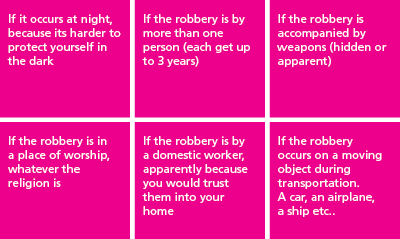
Hope the above helps you out. One more thing I forgot to mention, the cost of the item doesn’t matter so a packet of AAA batteries or a gold necklace are treated the same.
Fajer Ahmed – Legal Counsel
Have a Kuwait law related question? Email me at [email protected]
The legal opinions expressed in this post are those of the author Fajer. Opinions expressed by Mark or any other writer on mark248am1.wpenginepowered.com are those of the individual’s and in no way reflect Fajer’s opinion.

I had no idea who Dru Hill were until a few moments ago (thank you Wikipedia). Drul Hill are an R&B group and they’re going to be performing in Kuwait this summer. The event is a dinner at The Crowne Plaza Hotel that starts at 7PM and ends at 1AM with Dru Hill starting performance at 8PM.
Tickets start from KD30 for the regular seats all the way up to KD65 for VIP seating. If you’re interested or looking for more information click [Here]
Thanks Burhan

Wendy’s, Arbys, A&W and In-N-Out still MIA. [Link]
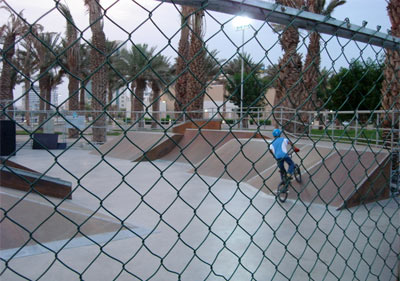
Sorry for the late notice but I just found out about this. Tomorrow (Friday March 29) at 3PM Extreme Sports is going to be holding a BMX and skateboard competition at Marina Skatepark. If you don’t know where that is, it’s just outside of Marina Waves at the edge of the beach and park. You can still register if you want to compete as well.

When McDonald’s opened an outlet in Kuwait shortly after the end of the Gulf War, the line of cars waiting to eat there was seven miles long.
[Source]
Note: In case you’re wondering, thats a McGangBang in the picture.